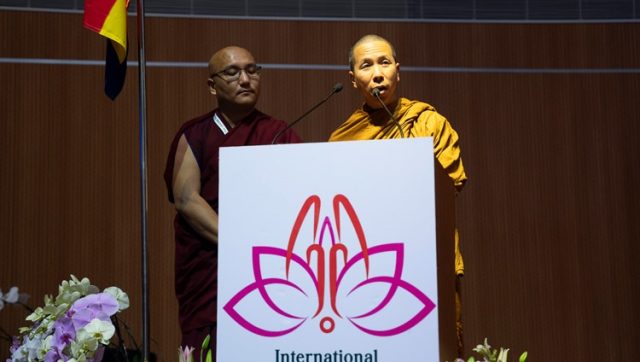
The moderator, Ven Mahayano Aun greeting the assembled representatives of the different Buddhist traditions and introducing the program of the International Sangha Forum at the International Convention Centre Bodhgaya in Bodhgaya, Bihar, India on December 20, 2023. Photo by Tenzin Choejor
By — BT NEWSDESK
Bodhgaya, Bihar, India, 20 December 2023: This morning His Holiness the Dalai Lama drove the short distance from Ganden Pelgyeling Monastery to the International Convention Centre, Bodhgaya, where he was to take part in the inaugural session of the first International Sangha Forum (ISF). He members of the organizing committee welcomed him at the door. Before going inside, he took a moment to enjoy a group of Mönpas from Arunachal Pradesh dancing on the lawn in celebration of his arrival.
Once His Holiness had taken his seat on the stage between the Ganden Tri Rinpoché and the Chief Minister of Arunachal Pradesh, Shri Pem Khandu, the moderator, Ven Mahayano Aun paid homage to the Buddha, Dharma and Sangha, saluted His Holiness and greeted all the representatives of Buddhist traditions in this most auspicious place. He declared the aim of the Forum was to hold a dialogue on role of Buddhism in the 21st century and to discuss how to create understanding and cooperation among the array of Buddhist traditions. He announced that there would be three days of discussions, followed on the fourth by prayers for peace in the world in the vicinity of the Mahabodhi Temple. Siling Tongkhor Rinpoché translated this introduction in English was into Tibetan.
To begin with, a group of Theravadin monks recited the ‘Karaniya Metta Sutta’—’The Buddha’s words on loving-kindness’—in Pali. They were followed by a group of monks from the Sanskrit University in Varanasi who chanted the Mangala Sutra—the Sutra of Auspiciousness—in Sanskrit.
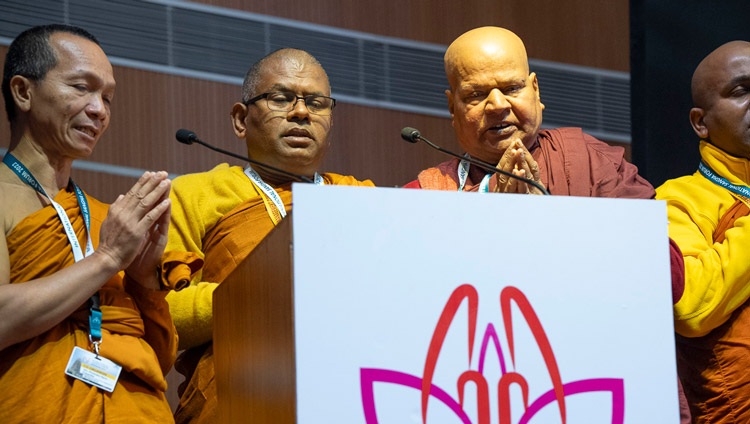
A group of Theravadin monks recited the ‘Karaniya Metta Sutta’ in Pali at the start of the inauguration of the International Sangha Forum at the International Convention Centre Bodhgaya in Bodhgaya, Bihar, India on December 20, 2023. Photo by Tenzin Choejor
The moderator requested His Holiness and other leaders to press buttons before them to light a lamp of wisdom and open proceedings. As they did so, a bright multicoloured electric lamp appeared before them, and on the large screen behind them, to great fanfare.
Secretary of the International Sangha Forum Ms Wee Nee Ng welcomed His Holiness, Chief Minister Pema Khandu and all the guests to this first meeting of the ISF. She reiterated that the purpose was to establish collaboration between the Buddhist Pali and Sanskrit traditions and to discuss what it means to be a Buddhist in the 21st century. She expressed the hope that the conference would contribute to making the world a better place,
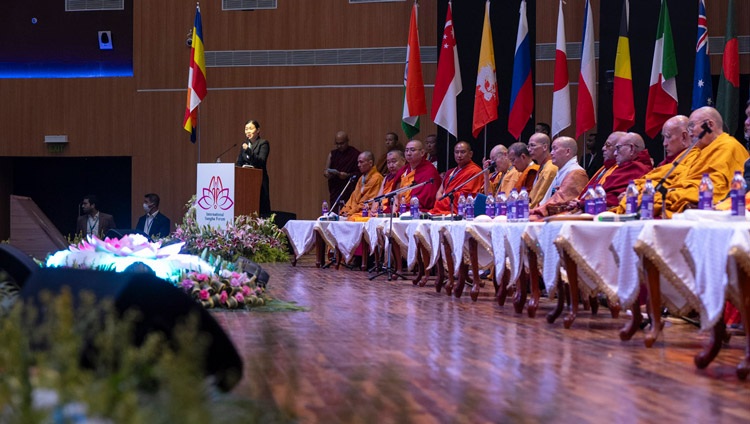
Secretary of the International Sangha Forum Ms Wee Nee Ng welcoming the participants and guests to the first International Sangha Forum at the International Convention Centre Bodhgaya in Bodhgaya, Bihar, India on December 20, 2023. Photo by Tenzin Choejor
Director General of the International Buddhist Confederation (IBC) Abhijit Halder disclosed that it was an honour for him to speak before such an esteemed gathering. He predicted that the message of this conference would have significant impact. He mentioned that humanity has recently seen an increase in flooding, drought and earthquakes. The oceans are rising, while snowfall in the mountains is declining. We must ask, he said, what we have done to make nature so angry with us. It makes us pause to ask where we’ve gone wrong and what we have to do.
He quoted what His Holiness had said at the Rio Earth Summit in 1992:
“I believe that to meet the challenge of our times, human beings will have to develop a greater sense of universal responsibility. Each of us must learn to work not just for his or her self, family or nation, but for the benefit of all mankind. Universal responsibility is the real key to human survival. It is the best foundation for world peace, the equitable use of natural resources and, through concern for the future generations, the proper care of the environment.”
At a time when warfare has broken out in several parts of the world, Halder noted, the primary focus of the Dharma is to develop compassion and wisdom. The Buddhadharma is part of the world’s culture, he went on, it teaches us how to live in peace with prosperity and compassion. We need to shift our attention to what will make human beings more compassionate and peaceful. The teachings of the Buddha, intended to relieve suffering, show us how to live at ease in peace and harmony. These were the instructions that the emperor Ashoka encouraged to spread across Asia.
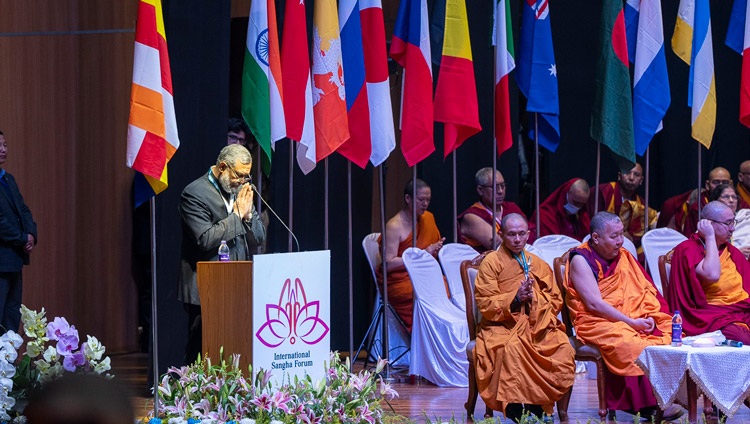
Director General of the International Buddhist Confederation (IBC) Abhijit Halder speaking at the inauguration of the first International Sangha Forum at the International Convention Centre Bodhgaya in Bodhgaya, Bihar, India on December 20, 2023. Photo by Tenzin Choejor
Halder ended by quoting a verse, so favoured by His Holiness, from Shantideva’s ‘Bodhisattvacharyavatara’,
As long as space endures,
And as long as sentient beings remain,
Until then, may I too remain
To help dispel the misery of the world.
Moderator Ven Mahayano Aun then asked His Holiness, who he referred to as the inspiration for everyone present, to give the conference’s opening address.
“I pay homage to the Buddha with my body, speech and mind,” he began. “Today, we are gathered in this sacred place where Buddha Shakyamuni attained enlightenment. And although we are living in a degenerate era, the Dharma he taught still shines bright.
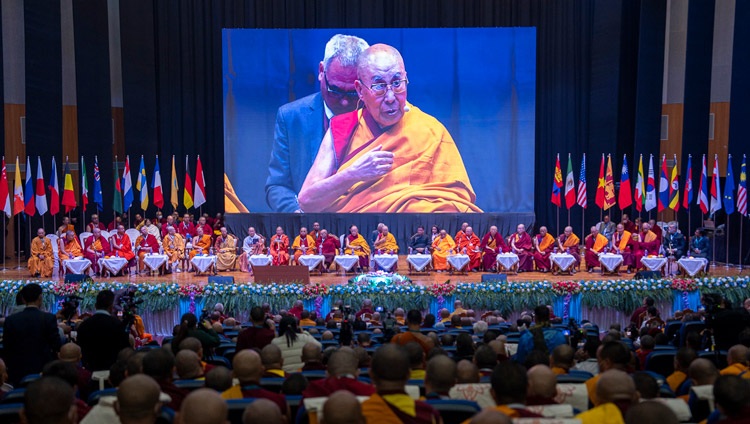
His Holiness the Dalai Lama addressing the inaugural session of the first International Sangha Forum at the International Convention Centre Bodhgaya in Bodhgaya, Bihar, India on December 20, 2023. Photo by Tenzin Choejor
“The Buddhas do not wash away unwholesome deeds with water, nor do they remove the sufferings of beings with their hands, nor do they transplant their own realization into others. It’s by revealing the truth that they help beings to become liberated.
“We make suffering for ourselves due to our destructive emotions. Because of ignorance we create negative karma. This is why the Buddha taught, ‘Do no wrong; cultivate virtue.’ So, we need to generate a good heart and avoid doing others harm. Instead of ill-treating them, we should help people and bring them benefit. Doing that will bring us peace of mind, which, in turn, will enhance our physical well-being.
“To act out of anger or attachment is a mistake. The essence of Dharma is to study what is taught, to reflect on what you’ve learned, and to apply what you’ve understood within yourself. If you cultivate an altruistic attitude, the awakening mind of bodhichitta, you’ll be able to fulfill the goals of yourself and others. “Thinking, may I generate bodhichitta, call on all sentient beings as your guests at the feast of enlightenment. Cultivating bodhichitta is a powerful practice. Along with it we can engage in the six perfections and the four ways of gathering disciples. The focus is serve other sentient beings. Do that and the world will become a friendlier, more peaceful place.”
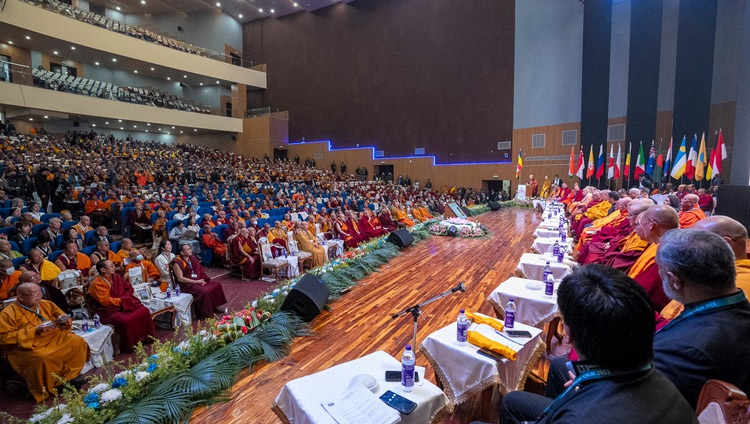
A view of the hall at the International Convention Centre Bodhgaya during His Holiness the Dalai Lama’s address at the inauguration of the first International Sangha Forum in Bodhgaya, Bihar, India on December 20, 2023. Photo by Tenzin Choejor
His Holiness harked back to the time of the Tibetan religious king, Songtsen Gampo in 7th century. He caused a Tibetan system of writing to be devised, based on the Devanagiri alphabet. Consequently, when Shantarakshita came to Tibet in the following century he advised Tibetans not to rely on the Pali and Sanskrit languages, but to translate Buddhist literature into Tibetan. The Kangyur and Tengyur collections of scripture and treatises are something we can be proud of. Our having preserved them has not only been good for us but can be of benefit to the world at large.
His Holiness remarked that people are becoming tired of materialism. Under these circumstances, if can cultivate warm-heartedness, we’ll not only feel physically at ease, but our minds will be full of joy. What’s more this will be a cause for being more warm-hearted in life after life.
“Bodhichitta is a precious practice. I’ve found it’s been very helpful for me,” His Holiness revealed, “so I ask all of you too to keep it mind. Help other beings; become a Buddha for them. By cultivating peace of mind within ourselves we’ll make a practical contribution to peace in the world.

Sangha members from different Buddhist traditions listening to His Holiness the Dalai Lama speaking at the inauguration of the first International Sangha Forum at the International Convention Centre Bodhgaya in Bodhgaya, Bihar, India on December 20, 2023. Photo by Ven Zamling Norbu
“I have observed the advantages that cultivating bodhichitta and the wisdom understanding emptiness can bring and I can attest to their practical value from my own experience. I haven’t developed single-pointed concentration, but if I had, I think I would make great progress. In the meantime, bodhichitta brings inner strength and confidence. It gives us the courage to work for all sentient beings.”
His Holiness commented that the mantra of the ‘Heart Sutra’ indicates the step-by-step path to Buddhahood. When Avalokiteshvara recites it, “Tadyata gaté gaté paragaté parasamgaté bodhi svaha” (“It is thus: Proceed, proceed, proceed beyond, thoroughly proceed beyond, be founded in enlightenment”), he is advising followers to proceed through the five paths. His Holiness also mentioned how useful it can be to study the great treatises: Nagarjuna’s ‘Fundamental Wisdom of the Middle Way’, Shantideva’s ‘Entering into the Way of a Bodhisattva’ and Chandrakirti’s ‘Entering into the Middle Way’.
“In order to share experience with others,” His Holiness noted, “you have to have experience to share. These two principles, the awakening mind of bodhichitta and the wisdom understanding emptiness are the core of my practice. I invoke them every day from the moment I wake up. This way I gather merit and purify mental defilement. I continuously make a prayer to be of service to others as long as space endures. Being of benefit to others is the way to lead a meaningful life.
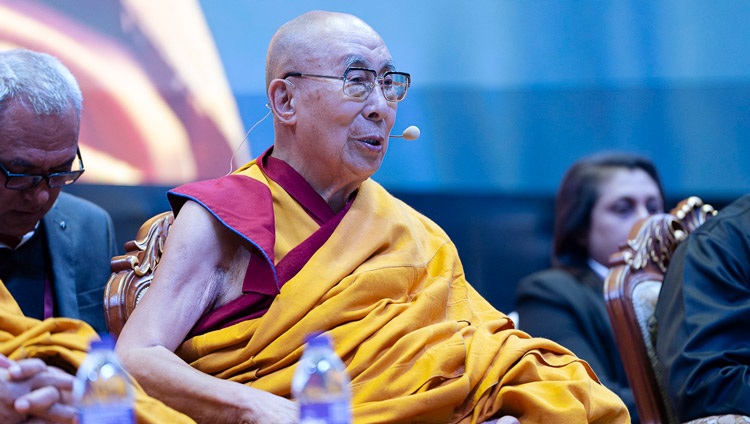
His Holiness the Dalai Lama speaking at the inauguration of the first International Sangha Forum at the International Convention Centre Bodhgaya in Bodhgaya, Bihar, India on December 20, 2023. Photo by Tenzin Choejor
“If you wish to help others, you need to discipline your own mind. I ask my Dharma friends to take this to heart. I was born in far-off north-east Tibet and was brought to Lhasa to study as a small child. Now I can feel the impact these practices have had on me, which is why I’m able to share them with you. I urge you to reflect on bodhichitta and the wisdom understanding emptiness.
“The essence of both the Pali and Sanskrit traditions is altruism. The most important thing is to cultivate bodhichitta.”
Representatives of the several Buddhist traditions came forward to address the assembly. Ven Ru-Jing, Abbot of the Bliss and Wisdom Monastic Community, Taiwan offered his greetings to the forum. Phra Dhambodhivong, Chief Abbot of the Royal Thai Monastery, Bodhgaya, representing the Thai Sangharaja and the royal family, Thailand, greeted His Holiness and prayed that the Three Jewels bless the forum and its proceedings.

Phra Dhambodhivong, Chief Abbot of the Royal Thai Monastery, Bodhgaya, representing the Thai Sangharaja and the royal family, Thailand, greeting His Holiness the Dalai Lama and and participants of the first International Sangha Forum at the International Convention Centre Bodhgaya in Bodhgaya, Bihar, India on December 20, 2023. Photo by Tenzin Choejor
Ven Khenpo Sonam Bhumden, Chief of Research and Translation, Office of Jé Khenpo, Bhutan, praised the opportunity the forum presented to conduct a thorough-going dialogue about Buddhism today. May all beings be blessed with peace and prosperity, he prayed.
Preah Iddhimuni Moeng Sang, the President of the Cambodian Buddhist Monk Society, USA, stated that it was an honour to be here in the presence of His Holiness and the Mahasangha. He mentioned that his group had recently completed chanting the entire Tripitaka here in Bodhgaya.
His Eminence Khambo Nomun Khaan, Geshé Jetsun Dorje, Abbot of Ganden Thekchenling Monastery, Mongolia, sent a message that was read on his behalf. He congratulated the organizers for bringing together such an assembly to discuss the role of Buddhism in the 21st century.

Ven Kumdin Na, Member of the State Sanghamahayanayaka, Yangon and Deputy Sangharaja of Myanmar, offering greetings at the inaugural session of the first International Sangha Forum at the International Convention Centre Bodhgaya in Bodhgaya, Bihar, India on December 20, 2023. Photo by Ven Zamling Norbu
Ven Kumdin Na, Member of the State Sanghamahayanayaka, Yangon and Deputy Sangharaja of Myanmar, offered his greetings.
Shadjin Lama, Geshé Lobsang Chödak, Head Lama of the Kalmyk Buddhists of Kalmykia, Russia, whose words were translated by Telo Tulku, offered his greetings and stated that it was an honour for him to take part in this forum in this extraordinary place.
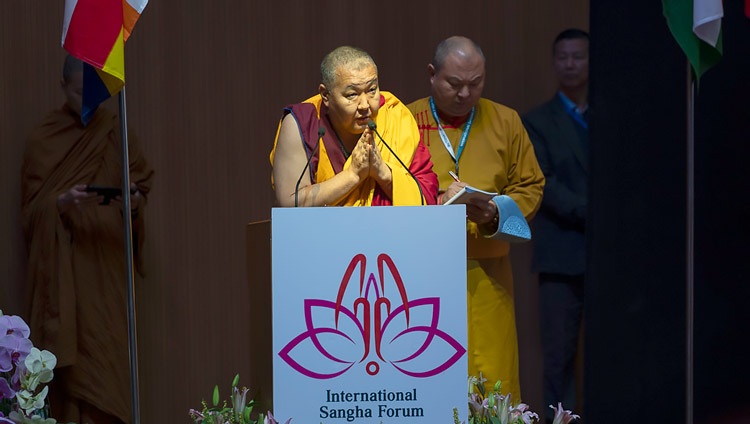
Shadjin Lama, Geshé Lobsang Chödak, Head Lama of the Kalmyk Buddhists of Kalmykia, Russia speaking at the inaugural session of the first International Sangha Forum at the International Convention Centre Bodhgaya in Bodhgaya, Bihar, India on December 20, 2023. Photo by Ven Zamling Norbu
The Ven Tri Mingzen a representative of the Vietnamese Buddhist Sangha invoked the Enlightened One saying “Namo Shakyamuni Buddha” and remarked that the key teaching about impermanence means that things are always changing. He paused for a minute’s meditation before continuing to comment on the significance of observing the precepts.
Most Ven Dr Warakagoda Gnanarathana Mahayanake Thero, the Mahayanake Thero of Asgiriya Chapter of Siyam Maha Nikaya, Sri Lanka, observed that religious conferences are held all over the world. What distinguishes this one is the opportunity to discuss the Buddha’s teaching of harmlessness and kindness here in the birthplace of Buddhism. And in this way, we try to preserve what the Buddha taught.
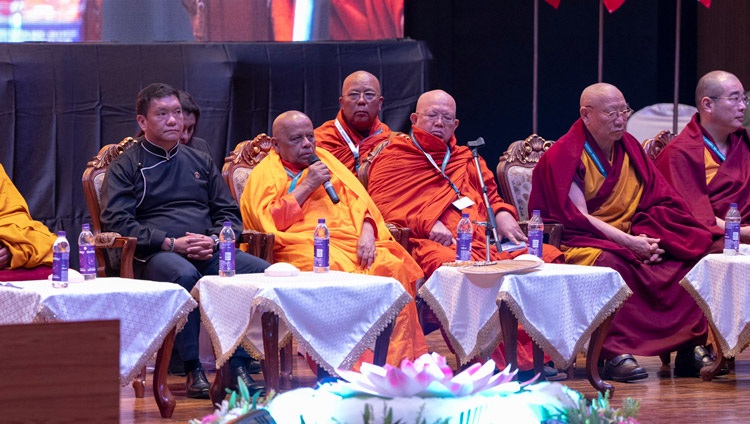
Most Ven Dr Warakagoda Gnanarathana Mahayanake Thero, the Mahayanake Thero of Asgiriya Chapter of Siyam Maha Nikaya, Sri Lanka, addressing the inaugural session of the first International Sangha Forum at the International Convention Centre Bodhgaya in Bodhgaya, Bihar, India on December 20, 2023. Photo by Tenzin Choejor
Shri Tashi Namgyal, Hon Executive Councillor, Ladakh Autonomous Hill Development Council, Leh, offered greetings on behalf of the people of Ladakh and encouraged spirited dialogue between the Pali and Sanskrit traditions.
Shri Pema Khandu, Hon Chief Minister of Arunachal Pradesh, India, saluted His Holiness, as well as scholars, monks and nuns.
“I thank His Holiness for blessing this assembly by his presence and for setting us an example,” he said. “I’m grateful that forums like this, that fulfil His Holiness’s vision of bringing the Pali and Sanskrit traditions together, are being held. And I’m happy to be able to take part in this sharing of knowledge and wisdom. We try not only to cultivate the Buddha’s teachings within ourselves, but also attempt to make them the basis of policy. May His Holiness live long.”
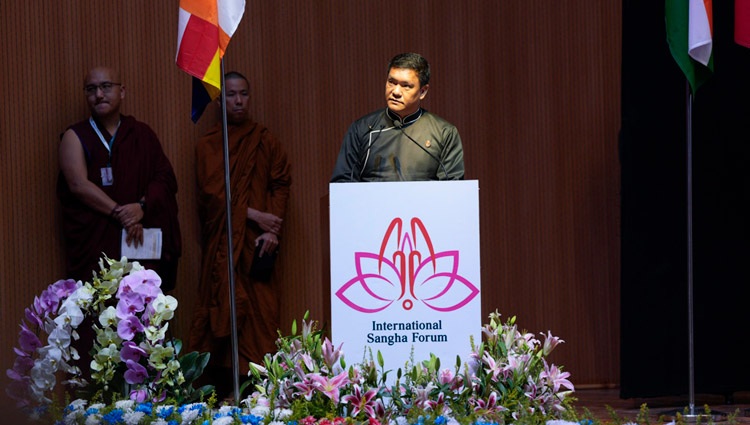
Shri Pema Khandu, Hon Chief Minister of Arunachal Pradesh, India, addressing the inaugural session of the first International Sangha Forum at the International Convention Centre Bodhgaya in Bodhgaya, Bihar, India on December 20, 2023. Photo by Tenzin Choejor
His Holiness asked to be able to add to what he’d already said.
“On this auspicious occasion, in this sacred place, I’d like to mention that when it comes to preserving the Buddha’s teachings, we should not be satisfied with merely wearing monastic robes. We must study and practise. We need to learn about the workings of our mind and emotions. Today, even scientists are interested to learn about the mind and the means for finding peace within.
“There are also different levels of subtlety in the mind, such as the waking state, sleep and dream. I’ve known people who have generated a dream body enabling them to go here and there at will. Practice of the Dharma is not only about conducting rituals and reciting prayers. It entails techniques for training our minds and tackling our emotions.

His Holiness the Dalai Lama delivering his closing remarks at the inaugural session of the first International Sangha Forum at the International Convention Centre Bodhgaya in Bodhgaya, Bihar, India on December 20, 2023. Photo by Tenzin Choejor
“The Tibetan tradition encompasses the entire teachings of the Buddha from both the Mainstream and Mahayana traditions, which include explanations of the subtlety of the mind. Thank you.”
Ven Khensur Jangchub Choeden, Secretary General IBC offered words of thanks.
“I pay homage to the Holy Sangha led by the great 14th Dalai Lama,” he began. “I’m delighted to express gratitude to everyone who has spoken this morning, to His Holiness the Dalai Lama, the Ganden Tri Rinpoché, the Arunachal Chief Minister and representatives of many Sangha communities. As we gather here in this most sacred place, we must be thankful for the insight contained in the Holy Dharma and for the sense of belonging and purpose it instills in our lives.
“Let us pause to recognise the diversity of this meeting. Let us use this gathering to learn, share and improve our mutual understanding. Let us open our hearts to each other.
“I thank all who have given support to this forum. Also, thanks to those who have provided accommodation for members of the Sangha. Thanks to all the tireless volunteers. And thank you all for coming. I hope you will leave Bodhgaya energised and inspired.”


